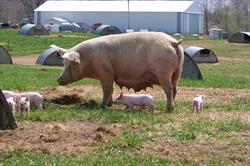Bob Judd, DVM, DABVP (Equine Medicine), DABVP (Canine and Feline Practice)
shutterstock_1060579.jpg

Atypical porcine pestivirus, or APPV, is a novel virus that mostly occurs in newborn piglets. This virus can lead to conditions called congenital tremors and splay leg. The major concern with APPV is the increased death of piglets due to the inability to nurse and move around the farrowing stall.
If a herd has not had exposure to APPV, which is called a naïve herd, the virus is associated with an increase in congenital tremors and splay leg in piglets. The disease is detectable in serum and oral fluids in symptomless animals.
In one study, a pig farm showed increased amounts of congenital tremors and splay leg in their farrowing rooms in early 2020. The diagnosis of APPV was made by finding APPV DNA in the animals.
This farm had no previous cases of APPV. It is believed the virus entered the herd from either replacement female pigs that had not been bred (called gilts) or incoming semen intended for artificial insemination.
To investigate, a study was completed to figure out the prevalence and source of the virus, and the occurrence of the virus in offspring gilts. Oral fluids were collected from different groups of pigs at different stages of growth on the farm as well as from semen.
The overall occurrence of affected litters within groups of pigs was 0-31%. At an offsite nursery, the virus was present in 37% of pigs in pooled serum samples on arrival and in 77% of the pigs at the conclusion of the study.
Oral fluids were also collected from the pens of all pigs present in the finisher barn, and 100% of the pigs were positive. This percentage was closest to 98.9% of the semen testing being infected with the virus.
The recommendation is to quarantine all incoming animals for a period of time and test for APPV using oral fluid samples. Testing the semen for APPV is recommended to limit the introduction of the virus to naïve herds.